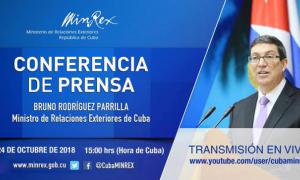Cuban Foreign Minister denounces U.S. maneuver to undermine international support for an end to the blockade
Granma | Thursday, 25 October 2018 | Click here for original article

Yesterday afternoon (October 25), the United States permanent mission at the UN began circulating eight amendments to the Cuban resolution calling for an end to the blockade, reported Cuban Foreign Minister Bruno Rodríguez Parilla during a press conference at the ministry in Havana.
He reported that the amendments basically address aspects related to the UN’s 2030 Sustainable Development Goals, and the human rights issue, a subject that the U.S. government attempts to use to discredit Cuba – unsuccessfully.
What is most interesting, Rodríguez said, is not the content of the proposed amendments, but rather the fact that the document was circulated surreptitiously by the U.S. State Department, signed by deputy assistant secretary Gonzalo Gallegos, in an effort to dissuade UN member countries from voting in favor of the Cuban resolution calling for an end to the blockade, which will be considered in the General Assembly this coming October 31.
The document, he pointed out, “recognizes that the Cuban resolution – approved practically unanimously every year in the United Nations General Assembly – has as its purpose condemnation of the impact on the Cuban people of the application of the blockade. This is a profoundly hypocritical and shameless phrase, recognizing that the blockade causes significant human damage to our people, deprivations, shortage, difficulties; it affects all families, discriminates against Cuban migration, and even restricts the civil rights and freedoms of U.S. citizens by prohibiting them from traveling to our country,” the minister stated.
This is another maneuver with propagandistic objectives, to manipulate public opinion and that of other states, Rodríguez noted, recalling that the U.S. has a long history of manipulating the human rights issue when it comes to Cuba, whose accomplishments in the areas of health, education, sports, culture, and political participation are undeniable.
He emphasized that the United States has no authority to accuse others of human rights violations, citing the well known existence of minors tortured in the Guantánamo Naval Base, on illegally occupied Cuban territory.
He also pointed out that, since 1997, the UN General Assembly has rejected these unfounded accusations on the issue of human rights in Cuba. What is most significant, he said, is that the amendments presented by the U.S. include the same content mentioned in resolutions previously rejected by the General Assembly.
The U.S. attempted to use the exact same approach in November of 2006, but a motion rejecting their proposals was approved.
This action by the United States has no international support - on the contrary, such proposals generate isolation and discredit. The vast majority of Cuban émigrés in the United States and around the world oppose this attitude.
At another point in the press conference, the Minister recalled the numerous occasions Cuba has proposed dialogue with the U.S. on any subject whatsoever, including human rights, on the basis of sovereign equality and respect for our independence.
“If the U.S. government wants to discuss the relation of human rights to sustainable development goals, we can do that. Just say when and where,” he added.
Then we could talk about the discrimination faced by Blacks and Latinos in U.S. territory; or women doing the same work as men for less; the hundreds of thousands of citizens who prevented from participating in elections because they have debts; or the wars launched by Washington, the massacres of civilians, he said.
The United States has signed only 18 human rights covenants, of the 61 existent, he noted, “It would be interesting for the U.S. government to attend a debate in the UN on adhesion to international human rights pacts and instruments. They are the only country in the world to vote against the right to food.”
The United States is pursuing an increasingly hostile policy toward Cuba, linked to the anti-Cuban industry in Miami. It again attempts to cover up widespread rejection of the blockade by the international community and within its own society.






